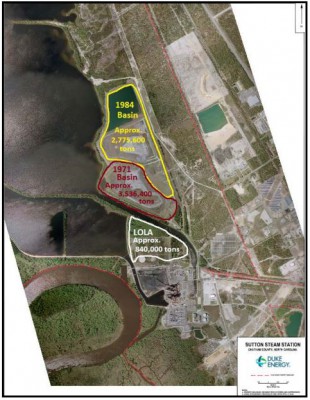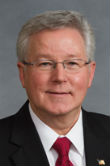RALEIGH — With a March primary and an early start to the session, the N.C. General Assembly’s environmental oversight committees have begun prepping legislation for this year’s short session, including a potential revision to a coal-ash bill passed two years ago.

The legislature’s Environmental Review Commission devoted much of last week’s meeting to coal ash. Tom Reeder, an assistant secretary for the N.C. Department of Environmental Quality, gave commission members an assessment of the effects overseeing coal-ash cleanup will have on his agency and leveled a blistering attack on the federal Environmental Protection Agency for its role in draining coal-ash ponds in the state.
Supporter Spotlight
Reeder said DEQ is stretched “to the breaking point” to keep up with a timetable mandated in a bill the legislature passed in 2014 that requires the cleanup of the 32 ponds at 14 Duke Energy power plants.
He also sharply criticized EPA officials in Atlanta for not moving faster on proposed changes to federal permits for wastewater discharge that would allow decanting and dewatering to begin at most of the ponds. Those are the first steps in the cleanup process.
DEQ in December approved an updated discharge permit for ponds at Duke Energy’s L.V. Sutton power plant in New Hanover County, one of four high-priority sites where excavation and removal of coal ash has already started. The permit allows the plant to begin drawing down water in the ponds at the rate of one foot a week.
Reeder expressed frustration in getting the water out of the remaining ponds, charging that the EPA took more than 15 months to approve decanting at the sites and is currently holding up approval on permit modifications that would allow dewatering at 13 sites. Decanting is the removal of the surface water in the pond, while dewatering is the final step in removing the rest of the water ahead of excavation.

“Until we get the water out of those ponds we’re going to continue to have groundwater contamination, we’re going to continue to have threats from this water to dams and surface water,” Reeder said. “The key thing is we’ve got to make those ponds dry.”
Supporter Spotlight
Legislators shared his frustration. “We may not know what steps 25 and 30 are, but we certainly know what steps one and two are and that is decanting and dewatering,” said Rep. Jimmy Dixon, R-Duplin.
During questioning by commission members, Reeder said DEQ secretary Donald van der Vaart is considering what Dixon termed “unilateral action” to move forward with the revised pollution-discharge permits and start dewatering the ponds without EPA approval.
In a response to a request from for details on the move, Crystal Feldman, DEQ deputy secretary for public affairs, said EPA approval of the discharge permits is a courtesy and not a requirement.
“When given a permit to review, EPA may offer comments, object to or remain silent on the permit. DEQ may issue the permits if EPA does not object. As a courtesy, in recent years DEQ has waited for explicit EPA approval before issuing coal-ash permits despite it not being required by law,” Feldman wrote in an email. “Assistant Secretary Reeder noted that we may no longer provide that courtesy.”

Feldman said the department has yet to decide how to proceed on the permits. “The EPA is struggling with how to handle these types of permits because they are the first of their kind in the nation, which has caused long delays in the permitting process,” Feldman wrote. “If DEQ is faced with a choice between protecting the environment or the federal bureaucracy, protecting the environment will win every time.”
EPA officials in Atlanta said they are moving forward on permits that would allow dewatering following procedures set out in a memorandum of understanding with the state. DEQ has forwarded to EPA two proposed final permits that include dewatering, explained Davina Marraccini, an agency spokeswoman. EPA completed its review of the first permit and has asked for a 90-day delay, which ends on Feb 10, on the other. Such a delay is authorized by law, she said, and is included in a memo that the state signed.
Legislators at the meeting said the timetable in the cleanup bill could be adjusted this session.
Chromium Standards Debated
Also during the ERC meeting, commission members looked into an interagency debate between DEQ and state public health officials over setting threshold levels of contaminants for a well-testing program near coal-ash sites.
The focus was on do-not-drink notices sent by the state Department of Health and Human Services based on testing around the 14 coal-ash sites. In all, more than 476 private drinking water wells near the sites were tested. Of that total, 424 well owners, about 89 percent, were issued do not drink notices by the department, with 369 of those notices triggered by levels of hexavalent chromium and vanadium that exceeded the standard used by health officials.
Reeder told legislators that the standards for hexavalent chromium was set far lower than federal drinking water standards for public water systems. Nearly every public water system in the state would get a similar notice if the standard was applied, he said.

Legislators also questioned the notices saying they alarmed residents and forced them to switch water sources unnecessarily.
Rep. Rick Catlin, R-New Hanover, said the notices have had a negative effect that in many cases outweighed the risk. He said future do-not-drink notices shouldn’t go out unless there is clearer evidence.
“Wait until we have that information to tell them to quit drinking their water, because we are impacting them kind of unfairly (compared) to the way we’re impacting everybody else,” Catlin said.
State Health Director Dr. Randall Williams stressed that the risk evaluations were recommendations to residents and not regulations. He said the chromium standard used was based on public health standards for risk of cancer due to lifetime exposure at the levels of the well tested. “We’d rather error on the side of caution,” Williams said.
The department, he said, is waiting for new data and will re-evaluate its risk assessments, including looking at background levels for the areas tested.

“We’re in the midst of evolving science,” he said, adding that there has yet to be a standard set for hexavalent chromium and it is treated differently by different government agencies.
DEQ and DHHS have been charged with preparing a study for the ERC on how to set proper levels for hexavalent chromium and vanadium, two known coal-ash constituents that carry a high risk to public health. Few states have regulations on either. The study is due by April 1.
Grady McCallie, policy analyst with the N.C. Conservation Network said although it focuses on just two constituents, the outcome of the study could have a significant effect on how the state determines the extent and amount of groundwater contamination.
“The underlying issue is an important one and broader than just hexavalent chromium,” McCallie said in a recent interview. “How do you handle substances that change over time and those that are naturally occurring in some wells and not in others?”
DEQ officials have repeatedly pointed to naturally occurring levels of various toxic coal-ash constituents, such as arsenic, as a challenge in determining whether high levels in groundwater can be directly attributable to coal-ash basins.







